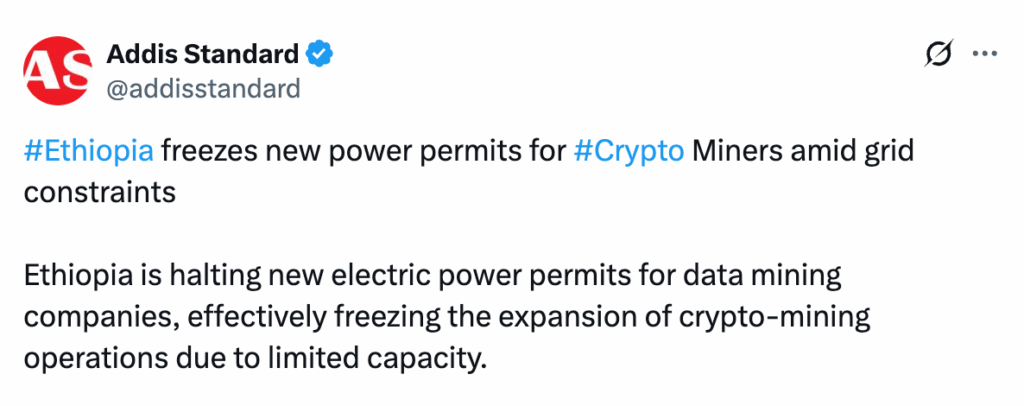|
Getting your Trinity Audio player ready...
|
Ethiopia has become the latest country to purge BTC block reward miners as their strain on the national grid becomes unsustainable.
The Ethiopian Electric Power (EEP) company recently announced that it intends to gradually phase out BTC miners from the East African nation as concerns mount over their astronomical power demands.

In its Ethiopian Energy Outlook 2025 report, EEP revealed that its short-lived romance with the block reward miners has come to its end, less than two years since it signed its first power purchase agreement with a mining firm.
“There will be no new contracts in the field of data mining, and we are not interested in continuing with existing ones either,” EEP CEO Asheber Balcha revealed during the grid operator’s annual performance review, as reported by the local paper, Ethiopian Reporter.
Ethiopia was hailed as the new destination for BTC miners who had been booted out of jurisdictions like China, Kosovo, Kazakhstan, and Norway. However, according to Balcha, EEP only sought a short-term dalliance with the sector to prop up its coffers and never intended to make Ethiopia a permanent home for the miners.
“We have only started it for a short time. After a few years, companies engaged in this sector will leave or shift to other sectors…Domestic consumers and strategic industries are always our priority,” he stated.
Ethiopia’s BTC mining honeymoon cut short
Ethiopia started warming up to BTC miners in late 2023, culminating in the first major arrival of a miner—Hong Kong’s West Data Group—in February 2024. The $250 million deal, signed with the Ethiopian Investment Holdings, was hailed as a new era for the country that prioritizes the next generation of digital industries.
Within the first ten months, the country had generated $55 million in revenue from the sector and contributed 2.25% of the global BTC hash rate. The revenue has surged since, with EEP making $220 million over the past year.
The miners have kept coming. EEP’s most recent data shows that it has signed power purchase agreements with 21 BTC miners, with 19 being foreign-owned and mostly linked to Chinese investors fleeing Xi Jinping’s anti-crypto regime.Earlier this year, Chinese miner BIT Mining signed a $14 million agreement with the Ethiopian grid operator to establish a 51 megawatt facility. It claimed that Ethiopia’s power was so cheap that it could reuse mining rigs that had become obsolete in its U.S. facilities, where they couldn’t mine fast enough to justify the power costs.
“The price of electricity is maybe 70% higher in Ohio than in Ethiopia, sometimes almost double, so it can only run very advanced ASICs…Now we can just move older generation machines into Ethiopia,” the company said at the time.
It’s not just BIT Mining (NASDAQ: BTCM) that was taking advantage of Ethiopia’s low power rates. BitFufu (NASDAQ: FUFU), Bitdeer (NASDAQ: BTDR), Canaan (NASDAQ: CAN), and the Phoenix Group (NASDAQ: PNXGF) have all established mining facilities in the country.
EEP projects that by the end of the year, BTC miners will consume a third of all Ethiopia’s electricity, and it is concerned that this could be at the expense of other essential sectors.
While the miners in the capital, Addis Ababa, enjoy the low power rates, a substantial portion of the country remains off-grid. Some sources say that nearly 60 million Ethiopians still lack electricity.
Ethiopia joins a list of countries that have restricted BTC mining due to energy concerns. While a few, like China, have issued a blanket ban for the sector, most have scaled back the energy allocated to miners. Russia, for instance, banned mining during winter when power demand is high.
The U.S. is one of a few countries bucking the trend. Since he took over, President Donald Trump has doubled down on making America the BTC mining capital, stating last year that he wants “all the remaining Bitcoin to be MADE IN THE USA!”
Trump’s rally has been backed by some red states like Arizona and Kentucky that have passed right-to-mine laws, protecting miners from being targeted by local zoning authorities.
The sector received a boost two months ago when the three largest Chinese ASIC manufacturers—Bitmain, MicroBT, and Canaan—announced they would set up production facilities in the U.S. as Trump’s tariffs disrupt global supply chains. The three control 90% of the global BTC mining rigs production.
Watch: Why Proof of Work is the most secure model of consensus

 02-22-2026
02-22-2026 




